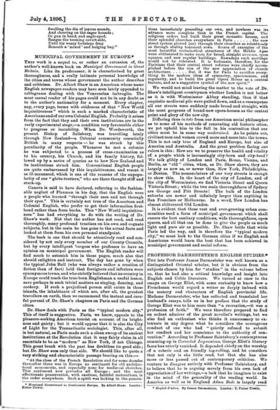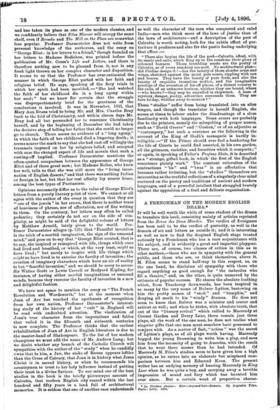PROFESSOR DARMESTETER'S ENGLISH STUDIES.* THE late Professor James Darmesteter was
well known as a distinguished Oriental scholar, but it is obvious from the subjects chosen by him for " studies " in the volume before us, that he had also a critical knowledge and insight into English and Celtic literature. We turned at once to the essays on George Eliot, with some curiosity to know how a Frenchman would regard a writer so deeply imbued with the scenery and characters of English provincial life. Madame Darmesteter, who has collected and translated her husband's essays, tells us in her preface that the study of George Eliot was to him more than "a recreation,—it was a profession of faith." We were therefore prepared to find an ardent admirer of the great novelist's writings, but we also find an enthusiast who thinks it unnecessary to ex, tenuate in any degree what he considers the courageous conduct of one who had "quietly refused to submit her conduct and her conscience to the authority of con- vention." According to Professor Saintsbury's contemptuous summing-up in Corrected Impressions, George Eliot's literary fame has utterly vanished. It depended chiefly on the worship of a coterie and on friendly log-rolling, and he considers that not only is she little read, but that she has also more or less passed out of contemporary criticism. We venture to disagree entirely with Professor Saintsbury, and to believe that be is arguing merely from his own lack of appreciation of her writings,—a lack that he imagines to exist in the mind of the generality of the reading world. In America as well as in England Adam Bede is largely read
• English Studies. By James Darnsestater. London : T. Fisher Unwin.
and has taken its place as one of the modern classics, and we confidently believe that Silas Hamer will occupy the same shelf, even if Romola and The Mill on the Floss are somewhat
less popular. Professor Darmesteter does not write from personal knowledge of the authoress, and the essay on " George Eliot: in her letters to a friend," though founded on
her letters to Madame Bodichon, was printed before the publication of Mr. Cross's Life and Letters, and there is
therefore nothing new to be gleaned from it, nor is any fresh light thrown on her complex character and disposition. It seems to us that the Professor has over-estimated the manner in which George Eliot parted with her faith and religious belief. He says, speaking of the fiery trials in which her spirit had been moulded, —" She had watched the faith of her childhood die in a long agony within her soul;" but we know for certain that the struggle was disproportionately brief for the greatness of the conclusions it involved. It was in November, 1841, that Mary Ann Evans tried to bring Mr. and Mrs. Charles Bray back to the fold of Christianity, and within eleven days Mr. Bray had all but persuaded her to renounce Christianity herself, and by the beginning of December she had taken the decisive step of telling her father that she could no longer go to church. There seems no evidence of a 'long agony," in which the faith of her childhood died a lingering death ; it seems nearer the mark to say that she had cast off willingly the trammels imposed on her by religious belief, and accepted with ease the changed aspect of life and morals that such a casting-off implied. Professor Darmesteter mentions the often-quoted comparison between the appearance of George Eliot and of three great men ; but Madame Belloo, who knew her well, tells us that she was still more the "living incar- nation of English dissent," and that there was nothing Italian or foreign in her, but that her real affinity lay nearer home, among the best types of Puritanism.
Opinions necessarily differ as to the value of George Eliot's letters from a purely literary point of view. We cannot at all agree with the author of the essay in question that they are "one of the jewels" in her crown, that there is neither trace of heaviness of phrase, nor of affectation, nor of fine writing in them. On the contrary, her letters may often be called pedantic; they certainly do not err on the side of sim- plicity, as might be said of the delightful volume of letters by Matthew Arnold, lately given to the world. Pro- fessor Darmesteter alleges (p. 125) that "Fanciful invention is the trick of a morbid imagination, the sign of the unsound mind," and goes on to say that "George Eliot created, that is to say, she inspired or reinspired with life, things which once had lived and breathed, or which, at the very least, might so have lived ;" but surely to inspire with life things which might so have lived is to exercise the faculty of invention ; the creation of imaginary characters which have an air of reality is but "fanciful invention," and we should be sorry to accuse Sir Walter Scott or Lewis Carroll or Rudyard Kipling, for instance, of having either morbid imaginations or unsound minds, because they exercise the faculty of invention in a new and delightful fashion.
We have not space to mention the essay on "The French Revolution and Wordsworth," but at the moment when Joan of Arc has reached the apotheosis of recognition from her own nation, Professor Darmesteter's interest- ing study of the history of her " cult " in England will be read with undoubted attention. The vindication of Joan's true character from the imputations and fables that veiled it in the fifteenth and sixteenth centuries is now complete. The Professor thinks that the earliest rehabilitation of Joan of Arc in English literature is due to the master-hand of Shakespeare. To the list of her modern champions we must add the name of Mr. Andrew Lang; but we doubt whether any branch of the Catholic Church will sympathise with the author of the " study" when he candidly owns that to him, a Jew, the stake of Rouen appears loftier than the Cross of Calvary, that Joan is in history what Jesus Christ is in sacred history, or when he recommends his countrymen to trust to her holy influence instead of putting their trust in a divine Saviour. To our mind one of the beat studies in the book is the briefly picturesque account of Caloutta, that modern English city reared within the last hundred and fifty years in a land full of architectural memories. It is seldom that one of another race understands so well the character of the men who conquered and ruled
India—men who think more of the laws of justice than of the laws of architecture—and a description of the port of
Calcutta is worth noting, both for the subtle effect of por- traiture it produces and also for the poetic feeling underlying that effect :— " There also begins the life of the port—Calcutta afloat, with its masts and sails, which fling up in the sunshine their glory of
coloured banners Those trembling masts are the poetry of Calcutta, as of every sunshiny sea-port. No architectural plan— did Phidias design it ?—has the beauty of those slender arms and wings, sketched against the moist pale azure, rippling with sun and breeze. They have tho beauty of pure form, and also the beauty of exquisite tremulous motion, and the imaginative prestige of the evocation of far-off places, of a distant country to the exile, of an unknown horizon, whither they are bound, where —who knows ?—they may be engulfed in shipwreck. A haze of mystery, danger, poetry, adventure surrounds them. They are here to-day, whither away to-morrow I"
These " studies " suffer from being translated into an alien tongue, and though the translator is herself English, she seems at times to labour under the disadvantage of a close familiarity with both languages. Some errors are probably due to the printers, namely the misspelling of proper names,
such as "David Greeve " and " Goshen," or of an adjective as " contempory," but such a sentence as the following in the account of the King of Oudh's menagerie is hardly in- telligible :—" If the Prince should ever feel a hankering for
the life of Courts he could find assorted, in his own garden,
all the grimaces, varieties, and ferocities which it comports ; " or again, in speaking of Fuller's Profane State, it is described as a "strange, gifted book, in which the first of the English conscience plainly work." The constant reiteration of the contractions " 'tis" and "'twas " is an affectation that becomes rather irritating, but the "studies" themselves are interesting as the truthful reflections of a singularly clear mind
nurtured on the poetry and traditions of ancient and modern languages, and of a powerful intellect that struggled bravely against the opposition of a frail and delicate organisation.











































 Previous page
Previous page